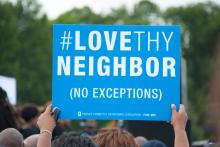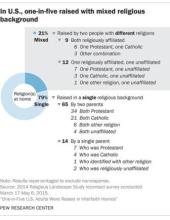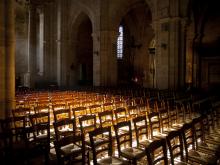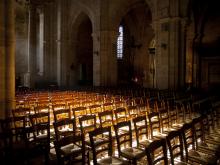Millennials

Anne Helen Petersen is a writer and journalist based in Missoula, Mont. She recently left BuzzFeed, where she was senior culture writer, and now runs the Substack newsletter “Culture Study.” In her new book, Can’t Even: How Millennials Became the Burnout Generation, Petersen dives into the systems and culture that have driven the generation’s need for constant productivity that led to burnout. In her latest newsletter, she focuses on the contours of clergy burnout.

For nearly a decade, pollsters have been reporting the trend of disaffiliation with the church, particularly among millennials. This shift is playing out in the black church, though the rates of disaffiliation and eschewing overall spirituality are less pronounced. Black millennials are more likely to pray and believe that a higher power exists than other races, but a steady percentage of black millennials are still disengaging — and they are not returning to the church as they age. Instead, they are finding new ways and places where they can be free to stand in their identity.

IT’S A WEDNESDAY night in early November and the sanctuary of Redemption Church in Olathe, Kan., is full. The audience, mostly 20- and 30-somethings, is listening in rapt attention to Mike McHargue, better known as Science Mike. Self-proclaimed science enthusiast McHargue, co-host (with musician and songwriter Michael Gungor) of The Liturgists Podcast, is doing a live episode of his solo side podcast, Ask Science Mike, as part of a tour for his new book, Finding God in the Waves.
After questions ranging from the neurological effect of belief on the brain to the role of women in the church, a young man stands and shares his story. He works at a conservative church, he says, and finds his beliefs are starting to differ from the people he works with. Finally, he asks, “When you start to ask big questions, and you don’t know where they’re going, and you don’t know where they’ll take you, how do you find the courage to continue to move forward when you know it might have dramatic consequences?”
“I have terrible news,” McHargue answers. “If this continues, you will not fit in where you are. How do I know? There are a thousand people at a Baptist church, who I love dearly, who could not stand to be in a room with me, because I’m the one who rebelled against the tribe.” He pauses a moment before continuing. “Here’s the other thing. This is good. The way you understood God, that served you for so long, isn’t working anymore because you’re growing. ... So I say, get excited.”
McHargue and his Liturgists Podcast co-host Gungor are no strangers to questions about belief, doubt, and straying from the theological tribe. Both men grew up in conservative evangelical churches, and both men lost their faith as adults, regaining it in a different form later on. It’s an experience familiar to plenty of the millennials and Gen-Xers who make up the “nones,” the growing portion of the U.S. population who have no religious affiliation.

While Christian witness doesn't mean necessarily going into seminary, Waggoner and Perry have both found, in pastoral training, their voices for this time.

I interviewed a dozen Christian millennials from different denominational backgrounds about these questions, and found that most of them disagree with the idea that government should be borrowing ideas from business in terms of how it operates.

According to several sources, the number 40 is used almost 150 times in the Old and New Testaments. Some examples: Jesus was tempted in the wilderness for 40 days and 40 nights. There were 40 years of wilderness-wandering for the Jewish people fleeing bondage in Egypt. Noah and his family were in the ark for 40 days and 40 nights of the flood. There were 40 days and 40 nights of fasting while Moses was on Mount Sinai. Jonah was given 40 days to convert the people of Nineveh. Saul, David, and Solomon reigned 40 years each.

The poll, conducted by the Pew Research Center, also found that, of those raised this way, most had one Protestant, or Catholic parent, and one religiously unaffiliated — sometimes called a “none” — parent.
“To be sure, religiously mixed backgrounds remain the exception in America,” the report on the poll states. “But the number of Americans raised in interfaith homes appears to be growing.”

Your weakness is never more obvious than when you show it to strangers — and you can’t avoid showing it to strangers when you live with them.
This is how you really love other people, too. There is nothing like putting yourself in a place where you need other people and their forgiveness to develop on your own love and affection.

It's my experience, observationally and personally, that people of faith go through the same kind of U curve, the same ennui that you experience psychologically. …. this malaise, this sense that you're praying and no one's listening, that the honeymoon is over. Those really rich feelings during prayer or everyday life — that God is here and present in this moment, “I feel the palpable presence of the Holy Spirit” — for most people, I think that ebbs. I think that's part of the plan.
… I talked to a group of nuns who are in their 50s, 60s, 70s, and 80s, because I figured they had a dog in this fight — if they lost their faith it actually would matter. What do you do when stuff gets boring or dull or hard? To a nun, their answer was the same — sometimes you don't feel God, and you just keep going. It's a relationship.

If your church is suddenly overtaken by millennials with their heads stuck in their phones, you can thank Pokemon.
Yes, Pokemon. The Nintendo-owned franchise, which produced colorful cards and later video games, is back — this time luring young adults out of their apartments and into museums, parks, and places of worship.

An annual “snow bird” sojourn to South Africa was convicting. The constant news highlighted the American political “silly season” along with the drumbeat reports of President Jacob Zuma’s illegal brutish behavior. An African storekeeper exclaimed, “Do Republicans not see the Trump antics are undermining the good feelings we have because of President Obama’s accomplishments? We are afraid for all of us.”

When I was 15, I stepped into a warm bath on my church's sanctuary stage. I was a bit of an outsider - the occasionally bullied Chinese-American kid in the white suburb - and I had found a place of belonging at this Chinese immigrant church. I made a joke about how I felt the same way about my new faith as my 16-year-old friend felt about her new driver's license: I had no idea how I ever lived without this. Even my pastor chuckled as he clasped my hands, preparing to dunk me.

I spend (most of) my Sunday mornings sitting in a pew at an Evangelical Lutheran Church in America congregation, singing old hymns, and reciting the Lord’s Prayer which I have had memorized since before I went to school.
At age 22, I make an effort to get my dose of word and sacrament before heading to brunch on Sunday mornings. Though I love the beach, I found greater joy in singing songs and leading Bible studies at a mainline church camp during my recent summers.
I love the sound of an organ.

Like many of my millennial peers, I was barely in diapers when the Cold War ended, never practiced fallout drills in school, and only recently learned what those yellow-and-black signs on old buildings meant. As a kid, if I thought about nukes at all, it was in a passive tense, World War II-history sort of way. In other words: not my problem.
But as we mark the 70th anniversary of Hiroshima and Nagasaki — when U.S. aircrafts dropped bombs on two Japanese cities, killing 135,000 people, by conservative estimates — I spent some time in the Sojourners archives trying to fill the gaps in my nuclear education. Here’s what I found.

According to a new study from the Pew Research Center, there are markedly fewer Christians and more “nones” — those who identify of no faith at all — in the U.S. than just seven years ago.
In the wake of this news, many critics have lost themselves in the question of who’s winning. But this isn’t a crisis. We don’t need to defend ourselves. We don’t need to obsess over whose team is in the lead.
But we also can’t just shrug our shoulders. If we have any faith that Christianity has value in the public sphere, we should be reasonably concerned when people begin to see little importance in Christian identity.
1. BB King, Blues Legend, Dead at 89
"The crowds treat me like my last name. When I go onstage people usually stand up, I never ask them to, but they do. They stand up and they don't know how much I appreciate it." — BB King, in a 2013 Rolling Stone interview.
2. The ‘Gang of Girls’ Risks Their Lives to Report from Inside a War Zone
Three of its editors have been killed, eight reporters detained and tortured, and 12 have fled the country. “In the ensuing void of order and information, Enab Baladi has become one of the most prominent independent publications of the war. That it's largely female-staffed is extraordinary. Women are barely represented in the government or in opposition groups—and certainly not in the Islamist gangs that control large swaths of the country. Yet the female editors and reporters have driven deeper coverage of how war affects civilians, families, and day-to-day life for millions of Syrians.”
3. WATCH: Divestment 101: What Do People Mean When They Say Divest?
To learn more, go to sojo.net/divest.
What We Mean When We Say DIVESTWhat do we mean when we say DIVEST?
Posted by Sojourners on Wednesday, May 13, 2015
4. There Are No Urban Design Courses on Race and Justice, So We Made Our Own Syllabus
“Instruction at Harvard’s Graduate School of Design is based in the work of architects whose worldviews don’t give heavy weight to social problems.” In that vein, here is a suggested reading list for urban designers to begin problem-solving and creating solutions for real-world environments.
5. Congrats! You Have an All-Male Panel!
The public shaming tumblr calls out events and conferences that feature all-male experts. A humorous, if not altogether depressing, screen scroll.

When did you last think about the relationship between your community's worship practices and their missions? It's such a loaded conversation. What makes for "mission?” Why do we set the two practices — what we do in worship and what we do after — at odds with one another? Is it simple geography? One happens behind the ecclesial closed doors while the other is more public? I want to know when we lost the sense that our liturgies were public events rather than secret rites. But that's another post.

A new survey shows in stark relief that what some are calling the Great Decline of religion in America continues: Since 2012, the U.S. has about 7.5 million more Americans who are no longer active in religion.
Last week, the 2014 General Social Survey was released. The GSS is the gold standard for sociological surveys. Funded by the National Science Foundation, this multimillion-dollar study gives us the most accurate data on American society — including religion.
(An important point to remember as you see the data: Each percentage point increase represents a growth of 2.5 million adults. So a 3-point rise in secularity, for example, means that about 7.5 million people left religion since 2012.)

Rachel Held Evans has grown into a powerful voice in American Christianity, first as the author of Evolving in Monkey Town and later with the New York Times best-seller A Year of Biblical Womanhood. Those who follow her writings often note that her thinking has become increasingly progressive, especially on hot-button theological issues such as gender and sexuality. That shift culminated in her leaving evangelicalism for the Episcopal Church.
Next month, Evans will release Searching for Sunday: Loving, Leaving and Finding the Church, a book that oscillates between stinging critiques of American Christianity and prescriptions for how she believes believers can more faithfully participate in church life. In an interview with Religion News Service, she talked about the key to revitalizing the church and defended her exit from evangelicalism. Some answers have been edited for length and clarity.
Q: You say that the way to stop the exodus of millennials from churches isn’t cosmetic changes like better music, sleeker logos, and more relevant programming. Why are these methods ineffective?
A: These aren’t inherently bad strategies, and some churches would be wise to employ them. But many church leaders make the mistake of thinking millennials are shallow consumers who are leaving church because they aren’t being entertained. I think our reasons for leaving church are more complicated, more related to social changes and deep questions of faith than worship style or image.
If you try to woo us back with skinny jeans and coffee shops, it may actually backfire. Millennials have finely tuned B.S. meters that can detect when someone’s just trying to sell us something. We’re not looking for a hipper Christianity. We’re looking for a truer Christianity.
Q: If these aren’t the answer, what is?
SARA WAS DESPERATE. She was fleeing an abusive husband, living with her mother in a mold-infested house, and she needed to rent an apartment. A recent college graduate, Sara had a job at a hospital that paid well and provided benefits. Apartment rent was within her means. But the background check came back to the landlord: “Do not rent.”
Sara (not her real name) was $22,000 in arrears on her student loans. The more she tried to pay the debt, the higher the interest rate climbed. Only after she filed for bankruptcy did she learn that none of her student loans were eligible for even the basic bankruptcy protection afforded other debts. At any time, the lender could garnish her wages—even to the point of making it difficult to pay basic living expenses, such as rent and utilities.
Sara is one of the new 21st century debtors, in financial bondage because they borrowed money for education. In 2014, the education debt in the United States totaled $1.2 trillion. More than 7 million borrowers are in default.